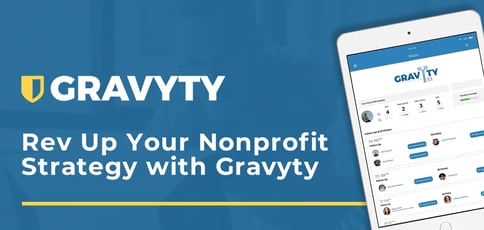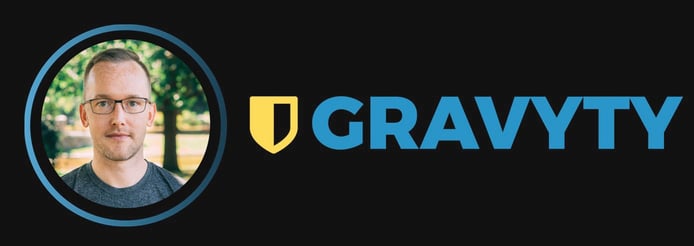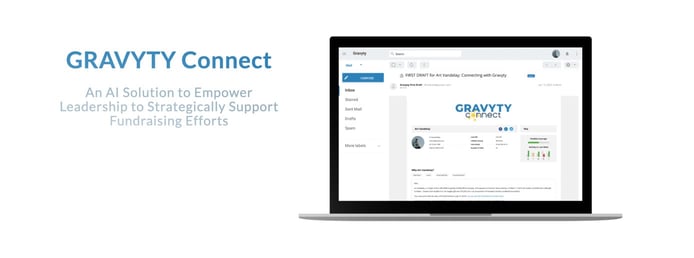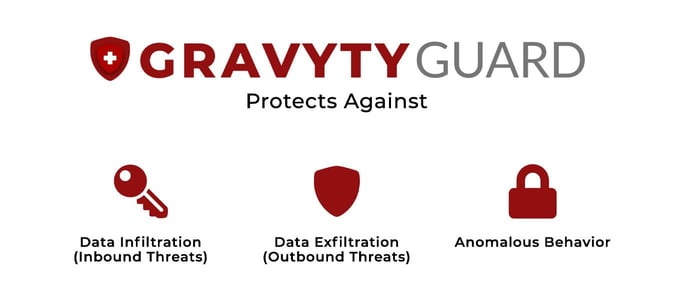
TL; DR: Gravyty is using the power of artificial intelligence (AI) to help the notoriously cash-strapped nonprofit sector raise money without hiring more people. The fundraiser enablement platform, primarily hosted in the cloud, optimizes an organization’s ability to build and maintain donor relationships — one of the most time-consuming aspects of philanthropy. With the philosophy that modern technology can dramatically boost fundraising, Gravyty aims to help nonprofits raise revenue that was unattainable in the past.
American computer and cognitive scientist John McCarthy is widely renowned as the father of artificial intelligence (AI).
He officially coined the term in a proposal for the 1956 Dartmouth Summer Research Project on Artificial Intelligence, which laid the foundation for the LISP programming language used in AI research.
The Rockefeller Foundation, a private group dedicated to solving global challenges via science, data, policy, and innovation, funded the pioneering conference, creating a historical tie between philanthropy and AI.
Today, more than 60 years later, the fundraising enablement platform Gravyty is reciprocating the gesture, helping nonprofit leaders optimize donor relationships through the power of AI.

Rich Palmer, Co-Founder and CTO, filled us in on how Gravyty uses AI to enhance the nonprofit workforce.
“McCarthy was able to bring great minds together at that summer conference because of a grant from the Rockefeller Foundation, so in a sense, philanthropy spurred the development of AI,” said Rich Palmer, Co-Founder and CTO of Gravyty. “And now, we’re able to return the favor, using AI to support philanthropy.”
The cloud-hosted fundraiser enablement platform leverages AI to supercharge the ability of nonprofits to manage donor relationships, tapping into revenue in ways that were never before possible. The company’s fundraising suite also includes tools for aligning AI technology with fundraising strategy and providing protection against data breaches.
Ultimately, the Gravyty team is united in its vision to help the nonprofit industry solve real-world problems using technology, which, until now, has only been within reach for those with commercial interests.
Helping Nonprofits Raise Funds via Artificial Intelligence
Rich told us he started Gravyty with Co-Founder Adam Martel, whom he met while studying at Babson College, a private business school in Wellesley, Massachusetts. Before Babson, Rich worked on Wall Street managing portfolio analytics and quantitative analytics teams, and Adam had worked as an Olympic volleyball coach.
After trying his hand at a few startups, Rich enrolled at Babson College to add entrepreneurship to his list of skills, which already included a heavy focus on tech. At the same time, Adam had left his coaching role to work on fundraising at Babson while pursuing an MBA. Both wanted to start a company.
“We started talking about the professional side of nonprofit fundraising,” Rich said. “You can only have so many relationships with donors before you need to start building relationships with new ones. But you can only manage portfolios of so many people in these massive data streams before it becomes a crippling job.”

Gravyty Connect offers automated tools that make it easy to garner fundraising support.
Rich had used AI to manage data in the past and thought he could use a similar mechanism within the nonprofit ecosystem. The two tested the idea at Babson and were impressed with the results.
“AI and machine learning were the cornerstones of our whole thesis. Our value proposition is what we like to call workforce expansion,” Rich said. “The idea is to create a replication of the human without necessarily hiring a human. We could make teams of 10 produce the same output as teams of 50 without putting extra work on them.”
That concept is now being employed in cloud-hosted AI products like First Draft, an email creation tool for frontline fundraisers, and Gravyty Connect, which helps leaders who are not traditionally involved with philanthropic efforts to automate fundraising support.
Protect Against Data Breaches with Gravyty Guard
Until recently, the Gravyty team primarily focused on products used to increase efficiency through workforce expansion. Now, with the introduction of Gravyty Guard, the company is offering data protection to safeguard donors’ sensitive data.
“The data security side of the equation is fascinating,” Rich said. “Everyone throws dollars at securing their servers, but they never think about securing their people. And human mistakes are the cause of 85% of data security lapses.”
Gravyty Guard automatically monitors networks for atypical behavior, alerting employees when they’re at risk of exposing personally identifiable business-sensitive information. It protects against inbound threats, such as phishing attacks. It also prevents well-intentioned employees who have authorized access to sensitive information from data loss and exposure.

The new offering acts as a shield against multiple attack surfaces.
And, with Gravyty Guard’s Threat Intelligence feature, managers and other leadership receive detailed reporting of risk exposure and threats. Also hosted in the cloud, these resources are designed to help with the investigation and remediation of breaches.
“Nonprofits, to their credit, have one defining currency, and that’s trust,” Rich said. “You mess up that trust, and you’re done. We’re proud that now we’re able to solve all sorts of problems, from donor management to data security, in the same journey on a platform setting.”
The Gravyty platform is considered Software-as-a-Service (SaaS), meaning that it’s conveniently hosted in the cloud, requiring nothing other than a browser for access. The exception is Gravyty Live, a service providing frontline fundraisers with personal guidance from fundraising professionals with an average of 10 years’ experience.
“Most of our customer support staff are former fundraisers who know how to solve unique problems, so we wrapped a bow on that service,” Rich said. “Our clients find that it’s a valuable addition.”
Education Through the AI in Advancement Advisory Council
There’s no doubt that AI is complex — there are aspects of the technology that even researchers don’t understand. For that reason, it can be difficult for nonprofit leaders to wrap their minds around its benefits.
To demystify the technology as much as possible and contribute to its advancement, Gravyty created the AI in Advancement Advisory Council (AAAC). The organization, powered by a council of volunteers, provides a forum for open discussion about AI, its current impact on fundraising, and emerging use cases.
“With AAAC, it’s not just Adam and me anymore,” Rich said. “It’s heads of nonprofits, of hospitals, of competitors. Everybody deserves to have a voice in how AI is used.”
In 2019, the AAAC released its first benchmarking study, The State of AI in Advancement Report. Industry pundits can share their opinions on the most recent challenges facing philanthropic organizations via a survey that will inform the 2020 study.
In terms of upcoming developments from the Gravyty team, Rich said the goal is to leverage a combination of tried-and-true technologies and emerging techniques.
“Where possible, we love using the technology that’s bulletproof and has been proven to work,” he said. “On the flip side, especially when it comes to natural language processing, there are advancements at the cutting edge of the cutting edge that we’re exploring.”
Helping Nonprofits Reap the Benefits of AI and ML
As for what’s next, Rich told us Gravyty is currently enjoying an enthusiastic response to its new data privacy solutions.
“There’s going to be a lot of forward momentum with that product for the next couple of months as we look to get this in the hands of as many people as possible,” he said.
The company, which primarily serves mid-level nonprofits and enterprises, also plans to focus on how to help smaller funding organizations.
“Not everyone needs to organize a hundred thousand people,” Rich said. “It’s my personal belief that we can spread the power of AI even further. It’s not going to be a quick journey, but we’re going to get on it.”
HostingAdvice.com is a free online resource that offers valuable content and comparison services to users. To keep this resource 100% free, we receive compensation from many of the offers listed on the site. Along with key review factors, this compensation may impact how and where products appear across the site (including, for example, the order in which they appear). HostingAdvice.com does not include the entire universe of available offers. Editorial opinions expressed on the site are strictly our own and are not provided, endorsed, or approved by advertisers.
Our site is committed to publishing independent, accurate content guided by strict editorial guidelines. Before articles and reviews are published on our site, they undergo a thorough review process performed by a team of independent editors and subject-matter experts to ensure the content’s accuracy, timeliness, and impartiality. Our editorial team is separate and independent of our site’s advertisers, and the opinions they express on our site are their own. To read more about our team members and their editorial backgrounds, please visit our site’s About page.

